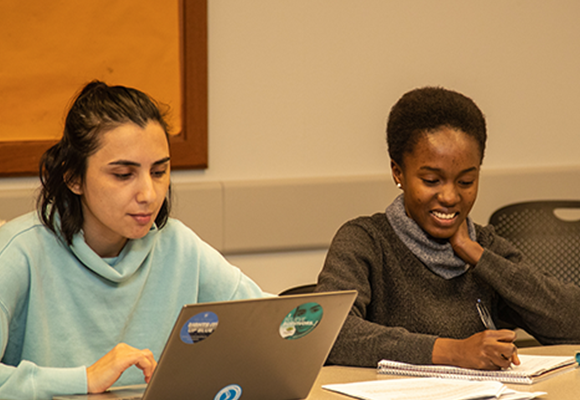Philosophy Major
The path to learning starts here
Philosophy lies at the heart of the liberal arts. It examines such fundamental human questions as the nature of knowledge, rational thought, ethics, beauty, justice, language, scientific inquiry, and the human self. Given the rigorous nature of the discipline, students of philosophy develop a mastery of analytical thinking skills and effective written and oral communication, giving them a competitive edge as they seek careers in a global marketplace.


Top Program
Philosophy and religion majors score among the highest on the Law School Admissions Test and are often accepted to law schools at above average rates.

In-Demand Skills
The critical thinking, writing, and speaking skills you develop in the philosophy major set you up for success in any career you pursue.
Career Prep
We’ll help you translate your major into the skills employers want in our Senior Seminar.
Find out More About Philosophy
Fill out your information here and we'll be in touch!
Contact us directly at:
Department of Philosophy & World Religions
University of Northern Iowa
Bartlett Hall 1089
Cedar Falls, IA 50614
Phone: (319) 273-6221
Email: michael.graziano@uni.edu

Learn more about UNI's Philosophy major
Hear from students and faculty in UNI’s Department of Philosophy & World Religions on how philosophy helps you uncover your passions, think critically, build community, and prepare for any career — from law to leadership. Whether you're double majoring or just curious, philosophy challenges you, changes you, and connects you.
What else do I need to know?
Scholarship opportunities
Several scholarship opportunities are available for students in the philosophy and world religions department. The CHFA Philosophy and World Religions Scholarship offers $1,000 per year. The Robert M. Schwyhart Memorial Endowed Scholarship provides $1,500-$2,500 per year. The Mabel Haywood Scholarship offers students $250-400 per year.

Philosophy Club
Philosophy Club works to create a space in which students of any background can come together, make friends, and build their community by collaboratively exploring questions and ideas found in philosophy through student-led discussions, activities, guest appearances from professors, and much more!

Careers
The ability to communicate effectively, to solve problems, to evaluate competing points of view, and to develop new approaches to life's unpredictable problems are skills important to any endeavor. These skills are in demand in today's work environment.
Recent UNI Philosophy graduates have held the following jobs:
- Attorney
- Teacher
- Accountant
- Museum Curator
- Psychologist

Courses
- Political Philosophy
Critical investigation of contexts of engagement and responsibility of persons as members of social institutions and as participants in public discourse on policy and law.
- Death, Sex, and the Body: Phenomenology & Foucault
Examination of phenomenology, the description of basic structures of human experience, including an examination of Michel Foucault's work on forms of power in social science and modern culture.
- Bio-Medical Ethics: Application of ethical theory to contemporary issues in medical practice and research. Topics include fundamental concepts of health and disease, life and death; rights and obligations of medical practitioners and their patients; abortion and euthanasia; reproductive and transplantation technologies; and health policy and the provision and rationing of health care.

Careers
The ability to communicate effectively, to solve problems, to evaluate competing points of view, and to develop new approaches to life's unpredictable problems are skills important to any endeavor. These skills are in demand in today's work environment.
Recent UNI Philosophy graduates have held the following jobs:
- Attorney
- Teacher
- Accountant
- Museum Curator
- Psychologist

Courses
- Political Philosophy
Critical investigation of contexts of engagement and responsibility of persons as members of social institutions and as participants in public discourse on policy and law.
- Death, Sex, and the Body: Phenomenology & Foucault
Examination of phenomenology, the description of basic structures of human experience, including an examination of Michel Foucault's work on forms of power in social science and modern culture.
- Bio-Medical Ethics: Application of ethical theory to contemporary issues in medical practice and research. Topics include fundamental concepts of health and disease, life and death; rights and obligations of medical practitioners and their patients; abortion and euthanasia; reproductive and transplantation technologies; and health policy and the provision and rationing of health care.

